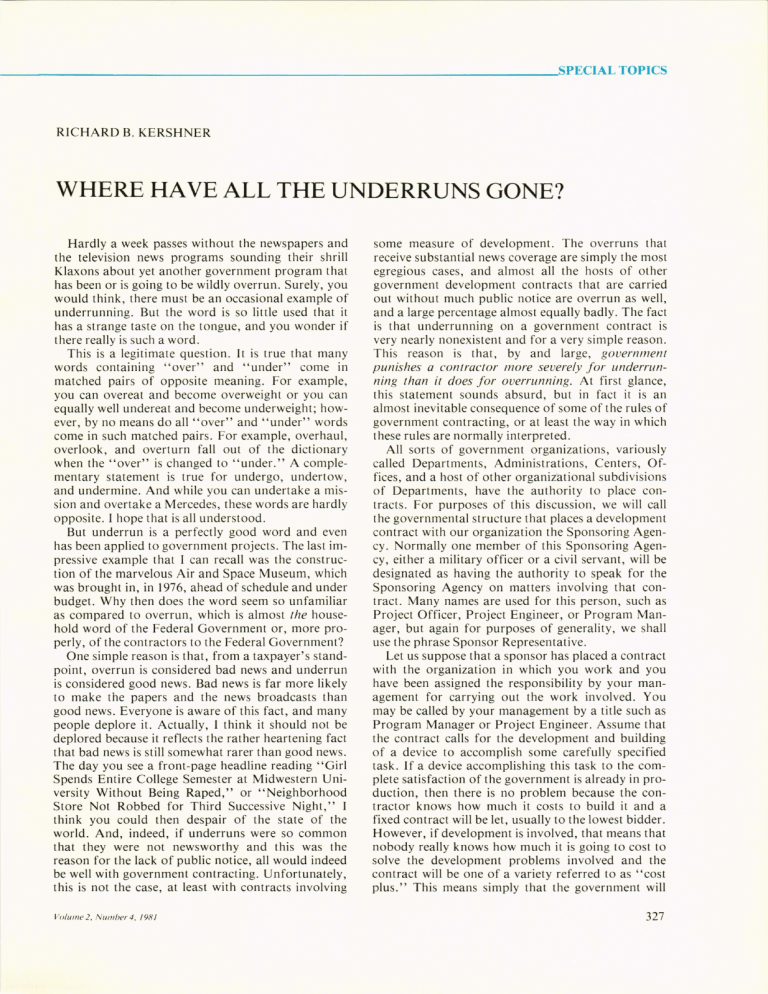WHERE HAVE ALL THE UNDERRUNS GONE? _________________________________________________________________ SPECIALTOPICS

_________________________________________________________________ SPECIALTOPICS
RICHARD B. KERSHNER
WHERE HAVE ALL THE UNDERRUNS GONE?
Hardly a week passes without the newspapers and the television news programs sounding their shrill
Klaxons about yet another government program that has been or is going to be wildly overrun. Surely, you would think, there must be an occasional example of underrunning. But the word is so little used that it has a strange taste on the tongue, and you wonder if there really is such a word.
This is a legitimate question. It is true that many words containing "over" and "under" come in matched pairs of opposite meaning. For example, you can overeat and become overweight or you can equally well undereat and become underweight; however, by no means do all "over" and "under" words come in such matched pairs. For example, overhaul, overlook, and overturn fall out of the dictionary when the "over" is changed to "under." A complementary statement is true for undergo, undertow , and undermine. And while you can undertake a mission and overtake a Mercedes, these words are hardly opposite. I hope that is all understood.
But underrun is a perfectly good word and even has been applied to government projects. The last impressive example that I can recall was the construction of the marvelous Air and Space Museum, which was brought in, in 1976, ahead of schedule and under budget. Why then does the word seem so unfamiliar as compared to overrun, which is almost the household word of the Federal Government or, more properly, of the contractors to the Federal Government?
One simple reason is that, from a taxpayer's standpoint, overrun is considered bad news and underrun is considered good news. Bad news is far more likely to make the papers and the news broadcasts than good news. Everyone is aware of this fact, and many people deplore it. Actually, I think it should not be deplored because it reflects the rather heartening fact that bad news is still somewhat rarer than good news.
The day you see a front-page headline reading "Girl
Spends Entire College Semester at Midwestern University Without Being Raped," or "Neighborhood
Store Not Robbed for Third Successive Night," I think you could then despair of the state of the world. And, indeed, if underruns were so common that they were not newsworthy and this was the reason for the lack of public notice, all would indeed be well with government contracting. Unfortunately, this i s not the case, at least with contracts involving
Vo lulll e2, NUlllbe r4, 19 8 1 some measure of development. The overruns that receive substantial news coverage are simply the most egregious cases, and almost all the hosts of other government development contracts that are carried out without much public notice are overrun as well, and a large percentage almost equally badly. The fact is that underrunning on a government contract is very nearly nonexistent and for a very si mple reason .
This reason is that, by and large, gove rnment punishes a contractor more severely jar underrunning than it does jar overrunning . At first glance, this statement sounds absurd, but in fact it is an almost inevitable consequence of some of the rules of government contracting, or at least the way in which these rules are normally interpreted.
All sorts of government organization s, variously called Departments, Administrations, Centers, Offices, and a host of other organizational s ubdivisions of Departments, have the authority to place contracts. For purposes of this discussion, we will call the governmental structure that places a development contract with our organization the Sponsoring Agency . Normally one member of this Sponsoring Agency, either a military officer or a civil servant, will be designated as having the authority to speak for the
Sponsoring Agency on matters involving that contract. Many names are used for this person, such as
Project Officer, Project Engineer, or Program Manager, but again for purposes of generality, we shall use the phrase Sponsor Representative.
Let us suppose that a sponsor has placed a contract with the organization in which you work and you have been assigned the responsibility by your management for carrying out the work involved. You may be called by your management by a title such as
Program Manager or Project Engineer. Assume that the contract calls for the development and building of a device to accomplish some carefully specified task. If a device accomplishing this task to the complete satisfaction of the government is already in production, then there is no problem because the contractor knows how much it costs to build it and a fixed contract will be let, usually to the lowest bidder.
However, if development is involved, that means that nobody really knows how much it is going to cost to solve the development problems involved and the contract will be one of a variety referred to as "cost plus." This means simply that the government will
327
pay whatever it costs you to develop and build the item plus some specified fee for agreeing to do the work. This fee may be a fixed, agreed-upon amount
(cost plus fixed fee) or an amount depending on various performance features, such as delivery dates or reliability of the product (cost plus incentive fee).
To keep the arithmetic simple, assume that the contract calls for building this specified device in one year's time for $10 million. Assume further that after a few months of work, you or one of the bright young men assigned to the program get a brilliant idea that shows how the device can be completed in a total time of six months for $5 million. I ask you to think about the consequences of doing this to your own future, your own organization's top management, the Sponsor Representative, the Sponsoring
Agency, the Bureau of the Budget, and Congress.
For your own top management, you have put them into a very serious hole. They were counting on that
$10 million to pay the salaries of a substantial number of employees for the presumed one-year duration of the contract. If you complete the job in six months for only $5 million, they will then have to scramble for some other contract, which may be hard to come by in the middle of the fiscal year, or be forced to layoff some of the people. Don't be totally shocked if one of them is you. To assess the sponsor's reaction, it is important to know that usually the extra $5 million does not go back to him, but instead goes directly to the U.S. Treasury. There it provides an absolutely miniscule diminution of the national debt. If the sponsor were able to use the extra
$5 million to start some other program he wanted to do but for which he was not supplied funds by Congress, he might be very grateful to you, but, as it is, the sponsor has no reason to love you and, on the contrary, has excellent reason to wish that you had never been so damn clever. Specifically, the Sponsor
Representative is in a position of being out of a job at midyear, and somebody will have to cope with this fact.
The very worst effect of this dramatic underrun comes about in next year's dealings between the
Sponsor and the Bureau of the Budget. They are very likely to say, "You people don't know how to estimate. You thought that job last year with the XYZ
Company would take $10 million and a year's time and it only took $5 million and six months, so we are going to trim your budget request for the coming year to reflect your poor estimating procedures."
Congress is only too likely to support this position of the Bureau of the Budget. As you can see, it is small wonder why a substantial underrun of a government contract simply does not happen.
Overrunning, on the other hand, is a totally different story. Sometime during the year, preferably before next year's budget requests are in, you tell the
Sponsor Representative that in spite of your best efforts the $10 million will be gone at the end of the year but the job will not be completed and completion will take an additional six months and $5 million. You will, of course, get a tongue lashing and a letter may be written from the Sponsoring Agency to your management, but the severity of the tongue lashing is held in check by the fact that nobody really believed the initial estimate anyway and there is ample warning to make the necessary adjustment in budget and personnel assignments in an orderly fashion. The Bureau of the Budget and Congress will recognize that it is foolish to cancel the program after
$10 million has been spent, when the job will be completed for $5 million more. There appears to be almost no limit to how many times this process can be repeated on a given program; and each time, the total amount already spent is larger and the absurdity of cancelling is made to seem more apparent. This technique, which could be called gradualism, is responsible for the really extreme overruns like the
Shuttle program.
Is this inevitable or is there any way that government research and development could be carried out that does not severely penalize ingenuity and finding a better way to do something? The answer is that there is a vastly better way, which was widely used for the development of new weapons during World
War II, and everyone who has investigated the matter agrees that it worked remarkably well. This method was to assign an organization a broad area of responsibility and a sum of money to support their activities in pursuit of this broad area for the first year. I should mention that at that time, the assignment of the Applied Physics Laboratory was "to protect the
Fleet from air attack." Under this simple authorization, the Laboratory was able to develop the proximity fuze and gun directors and to begin the development of antiaircraft guided missiles. There was no punishment for finishing a specific job ahead of schedule and at a lower cost because the allocated money remained at the Laboratory so they could simply get an earlier start on the next device in furtherance of the broad objective. This did not remove the government control in any real sense. If the government was truly dissatisfied with the progress made, it could always cancel the contract or substantially reduce the funds the following year. If it was very happy, it could recommend substantial increases in staff and funding. It made it possible to base the rewards of the contracting organization on their proven past performances just as you base the raises of your own employees on their past performances.
The present system is comparable to a supervisor calling all his employees together on the first of every year and saying,
"I
want you to promise me what you are going to accomplish next year, and your salary will be based totally on that promise. The date and consequence of every invention are particularly important. Past performance is 'water over the dam,' and I am not interested in that at all." If you think I exaggerate, I should mention that I have been told by a Sponsor Representative that he was totally uninterested in APL's accomplishments on any other program since it was "water over the dam," and only
328 Johns Hopkins APL Technical Digest
our performance on his program was of any interest.
This statement was made with considerable pride as if it reflected unusually profound wisdom.
I truly believe that most engineers, and indeed most people, would rather do a good job than a poor one. Indeed, there is a glow of satisfaction in getting a good idea or doing a good job. It is practically a reward in itself. But a contracting system that seriously punishes competence and ingenuity cannot fail to produce the kind of results that the newspaper headlines recount about current governmental research and development contracts. The miracle is that such marvelous programs as Polaris, Apollo, and Voyager are ever accomplished at any price.
Volume 2, NWl1ber4, 1981
329

